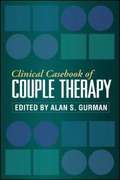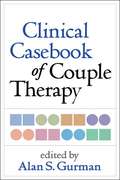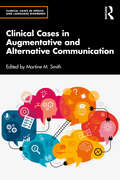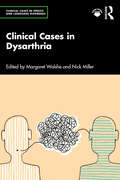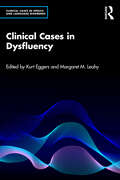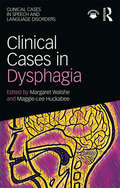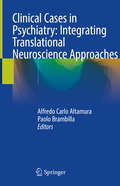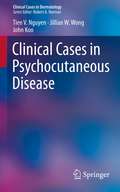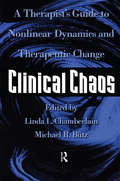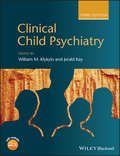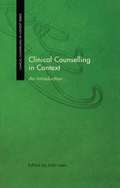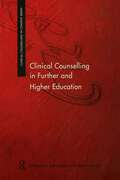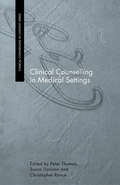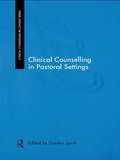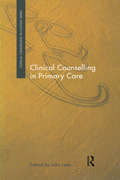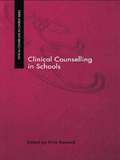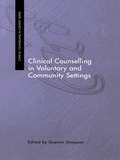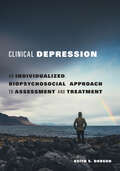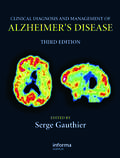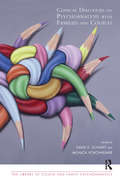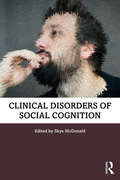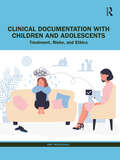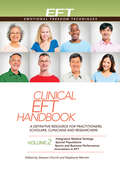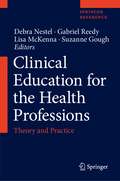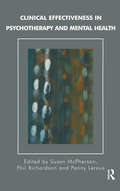- Table View
- List View
Clinical Casebook of Couple Therapy
by Alan S. GurmanVividly depicting the process of therapy, this instructive casebook presents in-depth illustrations of treatment based on the most important couple therapy models. An array of leading clinicians offer a window onto how they work with clients grappling with mild and more serious clinical concerns, including conflicts surrounding intimacy, sex, power, and communication; parenting issues; and mental illness. Featuring couples of varying ages, cultural backgrounds, and sexual orientations, the cases shed light on both what works and what doesn't work when treating intimate partners. Each candid case presentation includes engaging comments and discussion questions from the editor. This book will be valuable for therapists and counselors who treat couples, including clinical psychologists, social workers, family therapists, psychiatrists, and pastoral counselors; clinical graduate students. It will also serve as a text in graduate-level courses such as marriage and family therapy, couples counseling, social work practice with families, conjoint therapy, relationship distress, and treating couples.
Clinical Casebook of Couple Therapy
by Alan S. GurmanAn ideal supplemental text, this instructive casebook presents in-depth illustrations of treatment based on the most important couple therapy models. An array of leading clinicians offer a window onto how they work with clients grappling with mild and more serious clinical concerns, including conflicts surrounding intimacy, sex, power, and communication; parenting issues; and mental illness. Featuring couples of varying ages, cultural backgrounds, and sexual orientations, the cases shed light on both what works and what doesn't work when treating intimate partners. Each candid case presentation includes engaging comments and discussion questions from the editor. See also Clinical Handbook of Couple Therapy, Fourth Edition, also edited by Alan S. Gurman, which provides an authoritative overview of theory and practice.
Clinical Cases in Augmentative and Alternative Communication (Clinical Cases in Speech and Language Disorders)
by Martine M. SmithClinical Cases in Augmentative and Alternative Communication provides a concise introduction to the rapidly expanding field of augmentative and alternative communication (AAC). It brings together internationally renowned experts in the field to discuss its application and outline key principles of intervention to support communication using AAC. Carefully grounded in evidence-based clinical practice, the book highlights the diversity of potential applications for AAC across a wide range of client groups, including children and adults with developmental disabilities, as well as adults with acquired impairments. Most of the chapters are structured as case reports following CARE guidelines and highlight key principles for intervention that are grounded in clinical practice. The chapters also include reflections on communication through AAC and the valuable contributions that AAC can make in supporting independence and enhancing quality of life. This accessible book is ideal reading for students, novice clinicians in the fields of speech and language therapy or pathology, and professionals who are new to this area of clinical practice.
Clinical Cases in Dysarthria (Clinical Cases in Speech and Language Disorders)
by Nick Miller Margaret WalsheThrough the medium of detailed clinical case reports, written by well-respected clinicians and researchers working internationally in the field, Clinical Cases in Dysarthria discusses the challenges, and rewards of applying evidence-based procedures to people with dysarthria in real-life busy routine clinical settings. The text opens with an introduction to the latest research and practices within dysarthria treatment and sets the scene for the eight individual case reports which follow. These case reports form the core chapters of the text and cover themes that range from clinical diagnostic conundrums to applying popular, and/or novel intervention approaches to different populations where dysarthria presents. Each chapter has a specific argument drawing on theoretical principles of assessment and rehabilitation, incorporating latest research evidence to help readers problem-solve similar cases in their clinical practice. Throughout the text, readers are encouraged to ‘think outside the box’. This book will be essential for undergraduate and postgraduate student clinicians within speech and language therapy/pathology courses, as well as clinicians new to the field of dysarthria.
Clinical Cases in Dysfluency (Clinical Cases in Speech and Language Disorders)
by Kurt Eggers Margaret M. LeahyClinical Cases in Dysfluency is an imperative work that introduces dysfluency in clinical and cultural contexts while encouraging reflection on clinical decision-making involving the assessment and management of clients. With inputs from eminent clinical researchers across the world, this text brings together diverse voices and expertise to provide readers with innovative ideas for their own practice. The book assists in refining clinical problem solving and valuing exchanges between clients and clinicians. Featuring real-life case studies covering stuttering and cluttering in children and adults, it showcases the importance of evidence-based practice and practitioner reflection, demonstrating a range of approaches to address problems experienced with dysfluency, and their management. The authors go on to discuss issues of stereotyping, resilience, and therapeutic commonalities in general, and in multicultural contexts, whilst also introducing the discipline of Dysfluency Studies, where stuttering is considered positively in its complexity and not as a disorder. These concepts are effectively further illustrated through accompanying online resources including videos, and weblinks. This is an indispensable resource for students and clinicians in the domains of Fluency, Speech and Language Pathology and Communication Disorders, and will be valuable reading to anyone interested in communication disorders, dysfluencies, and application of theory to practice in these disciplines.
Clinical Cases in Dysphagia (Clinical Cases in Speech and Language Disorders)
by Margaret Walshe Maggie-Lee HuckabeeDysphagia is a complex condition that can have significant social, developmental and psychological effects. Alongside the physiology and pathophysiology of the condition, dysphagia can rob patients of the most basic pleasures, such as eating and drinking, causing ongoing difficulties for individuals in social situations throughout the lifespan. As an acknowledged component of evidence-based practice, the humble case report encourages clinical reflection and may be the spark that generates new thinking and motivation for future research. Clinical Cases in Dysphagia provides an opportunity to gain insight into the unique and varied presentation and management of dysphagia across a range of different conditions. With chapters provided by expert clinicians and based on clinical examples ‘from the trenches’, the reader may gain insights into their own practice patterns, refining their clinical problem solving and valuing the education that is offered to each of us by our patients. With additional online resources to support the case-based approach, the book emphasizes the importance of multidisciplinary care and reflects everyday clinical practice, making it a must-read for clinicians and students.
Clinical Cases in Psychiatry: Integrating Translational Neuroscience Approaches
by Alfredo Carlo Altamura Paolo BrambillaThis case series book offers a practical and accessible approach to psychiatry, addressing major clinical problems ranging from psychosis to aging effects, each of which is tackled as it arises in everyday settings. With its emphasis on everyday practice strongly linked to underlying theory, the book combines clinical knowledge with the realities of managing clinical problems, and will provide a basis for developing sound analytical and confident decision-making skills. Presenting different visions of clinical psychiatry and expanding psychiatrists’ interventions by integrating innovative neuroscience approaches such as neuroimaging, neuropsychology, TMS and cognitive rehabilitation, it will help clinicians and students alike gain a sound understanding of the wide range of signs and symptoms that indicate psychiatric disorders, and how the diagnosis, management and treatment options can differ from those in other medical specialties. The volume includes learning activities, with questions on each clinical case followed by detailed explanatory answers, and self-assessment exercises to assist with learning and revision. Throughout the book, tips and key features are highlighted with boxes, algorithms, tables and figures, which the reader can refer back to for exam revision and well into her/his career.
Clinical Cases in Psychocutaneous Disease (Clinical Cases in Dermatology #0)
by Tien V. Nguyen Jillian W. Wong John KooClinical cases are a key component in modern medical education, assisting the trainee or recertifying clinician to work through unusual cases using best practice techniques. Dermatology is an important discipline in this regard since it is a highly visual subject requiring the reader to describe often very subtle differences in the presentation of patients and define accurately the diagnostic and management criteria to base their clinical decision-making on. This is particularly the case in the field of psychocutaneous disease where scientific advances are shedding new light on the understanding and treatment of long-recognized conditions located at the interface of dermatology and psychiatry. Psychodermatology covers all aspects of how the mind and body interact in relation to the onset and progression of various skin disorders.
Clinical Chaos: A Therapist's Guide To Non-Linear Dynamics And Therapeutic Change
by Michael R. Bütz Linda ChamberlainFirst published in 1999. Routledge is an imprint of Taylor & Francis, an informa company.
Clinical Child Psychiatry
by Jerald Kay William M. KlykyloMaking a psychiatric diagnosis in children can be challenging: some clinicians say the incidence of some childhood disorders, such as bipolar disorder and ADHD, is over-diagnosed while others say they are undiagnosed, undertreated, and are a large burden on society. The drug treatment of child psychiatric disorders can also be controversial in children and adolescents. Clinical Child Psychiatry fills the need for an objective, clinically relevant source to dispel this confusion.
Clinical Counselling in Context: An Introduction (Clinical Counselling in Context)
by John LeesIn the light of the current professionalization of counselling, Clinical Counselling in Context examines the hypothesis that counselling theory and practice is altered by the specific organizational context in which it takes place - the consequence of which is that context is an important force for therapeutic change.It also argues that, with careful professionalization and a well-thought-out academic base, counselling can be a sophisticated activity which is not just the poor neighbour of psychotherapy.
Clinical Counselling in Further and Higher Education (Clinical Counselling in Context)
by John Lees Alison VaspeIn Clinical Counselling in Further and Higher Education, a range of well-known contributors show how this potential conflict can be used to the advantage of the counsellor. Clinical counselling in further and higher education is unique in that the counsellors work is, in most cases, to assist the primary educational task, rather than be an end in itself. Yet little has been written about the implications or possibilities of what is a complex relationship. It should prove invaluable to students, practising counsellors and psychotherapists.
Clinical Counselling in Medical Settings (Clinical Counselling in Context)
by Peter Thomas Susan Davison Christopher RanceClinical Counselling in Medical Settings offers an honest examination of the possibilities and limitations of counselling in a range of medical settings and patient groups. It shows how each setting has unique features that influence the therapeutic process. With numerous clinical examples covering settings such as a rehabilitation centre, a pain relief clinic and a hospice, this book will prove essential reading not only for counsellors and psychotherapists but also to all mental health professionals.
Clinical Counselling in Pastoral Settings (Clinical Counselling in Context)
by Gordon LynchPastoral counselling has had a significant role in the development of the wider British counselling movement over the past thirty years. Yet this role has often gone unacknowledged, and little has been written about the implications of its distinctive identity within counselling. Clinical Counselling in Pastoral Settings fills this gap by offering an exploration of clinical issues that are distinctive to the work of pastoral counsellors in a way that is made clearly relevant to practice, whilst exploring wider issues. Contents include: * Pastoral counselling in multi-cultural settings * Pastoral counselling and the therapeutic frame * Transference within the pastoral counselling relationship * Integrated theology and psychology in pastoral counselling * The promise and difficulties of pastoral counselling
Clinical Counselling in Primary Care (Clinical Counselling in Context)
by John LeesClinical Counselling in Primary Care examines the complexities and variety of uses of clinical counselling employed in a medical setting. With an estimated 2 in 3 GP sugeries now employing a counsellor or refering patients on a regular basis, this book tackles key debates head-on. It discusses a range of important clinical issues such as:* therapeutic framework* clinical work as part of the greater whole* the need to develop suitable therapeutic models.Clinical Counselling in Primary Care looks at possible developments in the future and argues for the improvement of the standing of counselling in relation to other primary care professsions.
Clinical Counselling in Schools (Clinical Counselling in Context)
by Nick BarwickToo often in education there is a split between those concerned with children's personal and emotional wellbeing and those focusing on academic achievement. At a time when counselling in schools is on the increase, working towards an integration of the personal and the academic is paramount.Clinical Counselling in Schools provides counsellors, educational psychologists, teachers, teacher-trainers and other interested professionals with essential insights into how counselling best works within a school. Covering a wide range of problems encountered in schools, the contributors - all experienced school counsellors show how the context, be it state or public, primary or secondary, mainstream or special school, needs to be acknowledged in order to support and foster the emotional and academic welfare of the child.Using a wealth of clinical information, Clinical Counselling in Schools is timely and essential reading for counsellors and all educational professionals who wish to utilise the full potential of counselling in the context of schools.
Clinical Counselling in Voluntary and Community Settings (Clinical Counselling in Context)
by Quentin StimpsonClinical Counselling in Community and Voluntary Settings provides an overview of the development of counselling in a world of managed care, where resources are tight and professionals are stretched to their limits. Experienced contributors from a varied and diverse background cover issues including:* the place of community and voluntary organisations in society at large* the nature of counselling in voluntary and community settings* containment and holding* the nature of the client group and its affect on clinical workThis book will provide theoretical and practical advice of interest to both experienced practitioners and students considering a placement with a voluntary counselling organisation.
Clinical Depression: An Individualized, Biopsychosocial Approach to Assessment and Treatment
by Dr. Keith S. Dobson PhDThis book offers integrative treatments for clinical depression based on the biopsychosocial model. Keith Dobson synthesizes decades of research and professional experience in this comprehensive guide that follows the therapy process from beginning to end. He starts with a theoretical overview of depression, including its associated features, risk and resiliency factors, and offers a comparative evaluation of various models of depression. Clinical chapters review the intake process, from the initial interview, to formulating an early case conceptualization and ensuring the client&’s involvement. Dobson then presents an organizational model to determine which issues to focus on in therapy, and the optimal interventions to address them. He also describes common strategies to target problematic behaviors and cognitions, develop problem-solving skills, and modify maladaptive thoughts and schemas. Guidelines for ending therapy and preventing relapse are also provided, as are considerations related to comorbid disorders, clients&’ relationships with significant others, and in-person vs. distance treatment. Recurring case examples with two hypothetical clients help to demonstrate the entire process for assessing, conceptualizing, and treating clinical depression.
Clinical Diagnosis and Management of Alzheimer's Disease
by Serge GauthierThe third edition of this successful textbook has been completely updated throughout and includes new chapters on electrophysiological tests, biological markers, global staging measures, and management of neuropsychiatric symptoms. There has been steady progress in our understanding of the natural history, prognostic factors and treatments for Alzh
Clinical Dialogues on Psychoanalysis with Families and Couples (The Library of Couple and Family Psychoanalysis)
by David E. ScharffThis book widens the scope of clinical and theoretical contributions on Couple and Family Psychoanalysis by collecting case presentations and discussions by analysts from Europe, North America, Latin America, China and Australia. The rich cross-fertilization across countries and analytic orientations stimulates cross-cultural thinking and deepens clinical exploration. In English language psychoanalysis, focus on object relations theory emphasizes internalization of early family figures in construction of the psyche, and their projective influence on others through continuing family interaction. Theories of the link and of the field explored in South America and Europe, shift focus from the internal life of the individual onto the influence of the other, and the way superordinate unconscious patterns introjected from previous generations are recreated by interacting members of families and couples, and in turn contribute to the continuing psychic evolution of individuals. Work in other cultures, such as China, brings us face to face with deep structures of thought and family organization that challenge Western psychoanalytic assumptions, even as those families are in rapid change themselves.
Clinical Disorders of Social Cognition
by Skye McDonaldClinical Disorders of Social Cognition provides contemporary neuroscientific theories of social cognition in a wide range of conditions across the lifespan. Taking a trans-diagnostic approach to understanding these disorders, it discusses how they present in different conditions, ranging from brain injury to neurodevelopmental disorders, psychiatric conditions and dementia. Social cognitive disorders directly impact upon individuals’ work, leisure and social functioning. This book also collates and critiques the best and most useful assessment tools across the different disorders and coalesces research into intervention strategies across disorders to provide practical information about how such disorders can be assessed and treated so individuals can have meaningful, effective and satisfying social interactions. This book is essential reading for clinicians who work with people with clinical disorders and who are looking for new knowledge to understand, assess and treat their clients with social cognitive impairment. It will also appeal to students and professionals in clinical neuropsychology, speech and language pathology and researchers who are interested in learning more about the social brain and understanding how evidence from clinical conditions can inform this.
Clinical Documentation with Children and Adolescents: Treatment, Risks, and Ethics
by Amy MarschallThis book addresses the unique challenges therapists face when documenting their clinical work with children, providing insight into what ethical, appropriate, and culturally competent practice looks like. Clinical documentation is vital for ethical and legal practice, and good documentation helps clinicians leave room for client-centered and age-appropriate interventions, such as play therapy. Beginning with an overview of the important considerations unique to providers working with children, Amy Marschall offers guidance on all aspects of clinical documentation, such as intakes, treatment plans, mental status examinations, progress notes, safety plans, and more. Each chapter includes specific examples of clinical situations with guidance on how to document these situations effectively. With chapters on client confidentiality and telehealth, as well as special attention being paid to cultural awareness, including race, ethnicity, gender, sexual orientation, and socioeconomic status, this book includes blank templates of treatment plans, progress notes, and risk assessments for therapists to use in their practice. This book is essential for any mental health professional who works with children in both individual and family work, including psychologists, licensed clinical social workers, licensed professional counselors, mental health counselors, marriage and family therapists, play therapists, school counselors, and therapist interns.
Clinical EFT Handbook Volume 2 (Clinical Eft Handbook Ser.)
by Stephanie Marohn Dawson ChurchEFT (Emotional Freedom Techniques) is used by an estimated 10 million people worldwide. Yet a lack of standardization has led to a field in which dozens of forms of EFT, with varying degrees of fidelity to the original, can be found. This led to the establishment of Clinical EFT, the form of EFT taught in the original EFT Manual and associated materials, and validated in over 20 clinical trials. In this volume, the most noted scholars, researchers and clinicians in the field compile a definitive outline of the EFT protocol, as it is applied in medicine, psychiatry, psychotherapy, and life coaching. This volume covers • Integrative Medical Settings • Special Populations (such as Children, Veterans, Addicts) • Sports and Business Performance • Innovations in EFT. These handbooks are essential reading for anyone wishing to understand EFT as validated in research, science, and best clinical practice.
Clinical Education for the Health Professions: Theory and Practice
by Debra Nestel Lisa McKenna Gabriel Reedy Suzanne GoughThis book compiles state-of-the art and science of health professions education into an international resource showcasing expertise in many and varied topics. It aligns profession-specific contributions with inter-professional offerings, and prompts readers to think deeply about their educational practices. The book explores the contemporary context of health professions education, its philosophical and theoretical underpinnings, whole of curriculum considerations, and its support of learning in clinical settings. In specific topics, it offers approaches to assessment, evidence-based educational methods, governance, quality improvement, scholarship and leadership in health professions education, and some forecasting of trends and practices. This book is an invaluable resource for students, educators, academics and anyone interested in health professions education.
Clinical Effectiveness in Psychotherapy and Mental Health: Strategies and Resources for the Effective Clinical Governance
by Phil Richardson Susan McPherson Penny LerouxIn this volume, the editors examine the state of clinical governance in the Mental Health sector. Despite the often confusing wealth of literature on the subject, little, if any, refers specifically to psychological treatment services. Clinical Effectiveness in Psychotherapy and Mental Health provides a guide to learning about the different guidelines and evaluation methods. It focuses on three important contributions to clinically effective practice: clinical audit, outcome monitoring and evidence-based practice.
